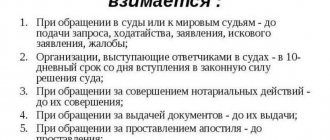When to use the 2021 state duty calculator
The plaintiff pays a state fee to the court when filing claims, applications and complaints.
In this case, the original document confirming payment of the state duty must be attached to the documents submitted to the court. The calculation of state duty has a certain algorithm. You can calculate the exact amount using a calculator. First, it is necessary to determine what the cost of the claim is, whether the payer can take advantage of benefits, whether a statement of claim or an application is being filed in a special proceeding for the issuance of a court order.
So, the state fee to the court. The 2021 state duty calculator is easy to use. Select the desired item. Then enter the claim price (note that not all claims are subject to valuation). The calculator will show the amount of state duty that will need to be paid. In addition, we will indicate the jurisdiction of civil cases (magistrate or district (city) court).
The amount received using the state duty calculator must be paid through a bank in the region where the claim will be filed. And on behalf of the document submitter (plaintiff, applicant).
The presented calculator is used:
- to calculate the amount of fees for consideration of cases considered by district (city) courts
- to calculate the amount of fees for consideration of cases considered by magistrates
- for calculating state duty in regional, regional, republican courts, in the Supreme Court of the Russian Federation
In 2021, the amount of the state fee to the court has not changed. When filing claims, starting from January 1, 2021, the state duty must be paid at the specified rates.
The state fee, in the event of a positive decision in the case, can be recovered from the defendant, like other legal expenses.
State duty to court for property claims
When the appeal is considered in arbitration, the amount of the fee in this case will be calculated slightly differently than when considering other cases. There are even various government services to calculate the amount of the required contribution. At the same time, when the amount has already been determined, before paying it is important to take into account the size of the bank commission, so you will need to pay a slightly different amount, because the documents indicate exactly the amount of the contribution that should go to the accounts.
Standard size
There will be no difficulties in calculating the state duty, especially if the dispute is not of some kind of property nature.
In rare cases, the state duty depends on the amount of the stated claims, but in cassation cases the amount of this payment is usually fixed and therefore there are no difficulties with payment if you correctly interpret the legislative norm for your case.
In the Tax Code of the Russian Federation, Art. 33.19 clearly regulates how much the state fee is for a cassation appeal in a civil case. If the case is of a non-property nature, then a court fee of 200 rubles is required for it, and for applications to the arbitration court with a property nature of the dispute - 50% of the total amount of the state fee for non-property disputes, that is, 50% * 200 rubles = 100 rubles.
The amount of 200 rubles is provided for filing a complaint by an individual. If the application is drawn up by an organization, then the state duty will be 4,000 rubles. This applies to those claims that do not require more detailed calculations.
Some disputes may result in an additional fee, the amount of which is determined based on the size of the claim and the value of the property in dispute. For some categories of the population (pensioners, disabled people, veterans) state duty is not provided - these are state benefits.
How to count
If you have any difficulties determining the amount of payment, it is better to use a calculator specially designed for this. It can be easily found on the website of the government institution in the relevant area (Arbitration Court, Supreme Court). In this case, usually the amount of the state fee for filing a cassation appeal will be fixed.
In this case, you do not need to calculate anything, but it is better, if quite a lot of time has passed since you became familiar with the latest information, to clarify the data on the website of the tax office or the court, since quite often the amounts of the state duty change. There, it is enough to simply select the main parameters of the case for which the appeal is being made to the court, and get the value.
The goal of civil proceedings is to resolve legal disputes of a property and non-property nature, restore violated interests or establish legal facts.
The reason for filing a cassation appeal in a civil case is a significant violation of procedural and substantive norms, as a result of which the interests and rights of the citizen were not restored.
Unfounded or illegal decisions become objects of review. These are (rulings or rulings made by lower courts: magistrates, district, regional, regional, military, supreme courts of the republics.
We suggest you read: How and where to complain about a hospital
Decisions made by:
- During writ proceedings (the goal is to recover money or property);
- Claim proceedings (housing, medical, family, insurance, labor disputes between the parties);
- Special proceedings (no legal dispute);
- Public dispute (challenging legal norms and decisions of officials and authorities).
The right of appeal is secured by procedural norms for the parties, third parties, representatives of the parties, the prosecutor general, republican, regional and military prosecutors.
Clause 12 of Article 333 of the Tax Code of the Russian Federation established that the cost of the fee for a cassation appeal is equal to half the price of the fee for a non-property claim.
Section 4.1. says that filing a non-property claim will cost citizens 300 rubles, and firms 6,000 rubles. Consequently, a cassation review will cost 150 rubles for individuals and 3,000 for legal entities.
Tax regulations provide for the possibility of an interest-free annual installment plan (deferment) for payment of duties based on a citizen’s request. A person applying for installment payment must prove his difficult economic situation.
The following must be attached to the application:
- certificates of family composition and income;
- pension certificate;
- certificate of disability;
- certificate of a large family;
- a copy of the work book with a record of dismissal;
- paper from the employment service;
- a certificate from the police about the emergency and many other documents.
By installments we mean making payments in several stages, and by deferment we mean an extension of the deadline for paying funds.
A citizen has the right not to pay the fee if he:
- Is disabled or a participant in the Second World War;
- Hero of the USSR, Russian Federation, Knight of the Order of Glory;
- Appeals a court decision related to divorce.
The plaintiff does not pay a fee for review of decisions in cases related to:
- With the collection of funds (wages, alimony, compensation for harm;
- With the adoption of children.
If the cost of the claim upon initial consideration of the case did not exceed one million rubles, disabled people of groups 1 and 2, pensioners and war veterans also do not pay a fee. These benefits are contained in paragraphs 35 and 36 of Art. 336 Tax Code.
Civil procedural rules have determined a single deadline for filing a cassation appeal in a civil case - 6 months from the date of the decision of the appellate instance. The state fee must be paid before filing the cassation and confirmed by a bank or cash receipt.
A cassation appeal may be considered:
- Judicial Collegium for Civil Cases;
- Collegium for Military Affairs;
- Presidium of the military court, regional and regional courts;
- Presidiums of courts of autonomous circles and regions.
Its consideration may entail the following legal consequences:
- Upholding the original verdict;
- Full or partial reversal of the original determination with a new hearing;
- Cancellation of the decision without a new hearing or with termination of the proceedings;
- Making a new decision if the original one contained errors;
- Leaving cassation claims without consideration.
Arbitration reviews cases related to challenging civil transactions, challenging the ownership of real estate, and collecting sums of money.

On June 4, 2021, the Presidium of the Regional Court of Ufa received a cassation claim from citizen Izmailova N.A. against the decision made by the court of appeal.
The initial decision concerned the division of the apartment between N.A. Izmailova and her ex-husband R.R. Izmailov. The appellate authority refused to satisfy the plaintiff’s demands, i.e., the division of the apartment.
In her cassation appeal, Izmailova referred to Article 34 of the Family Code and asked to recognize ½ of the apartment after the divorce, and also to recover R.R. from Izmailov. legal costs in the amount of 18,000 rubles.
During the cassation it was proven that the apartment was purchased with funds accumulated by the ex-spouse before marriage. This fact is confirmed by statements from the defendant’s bank accounts and certificates of his income.
Consequently, an apartment cannot be jointly acquired property and subject to division (Resolution of the Plenum of the Armed Forces of the Russian Federation No. 15 of 1998).
The cassation court upheld the decision of the appellate court and rejected N.A. Izmailova. in claims. Subsequently, the plaintiff appealed to the Supreme Court by way of supervision.
State duty (state duty) to court is a fee established by law that the payer must pay when going to court.
The state duty refers to legal expenses, which is enshrined in Article 88 of the Code of Civil Procedure of the Russian Federation, Article 103 of the Code of Arbitration Procedures of the Russian Federation. The Code of Civil Procedure and the CAS establish the procedure for determining the price of a claim and cases of additional payment of state duty. The provisions of the procedural codes establish the procedure for the collection and distribution of legal costs, including the state fee paid when filing a claim.
The amount of the state duty, the procedure for its payment, cases of granting benefits, the possibility of deferment, installments and refund of the state duty are established in Chapter 25.3 of Part 2 of the Tax Code of the Russian Federation. The state fee calculator does not take into account these individual privileges.
The amount of the state fee depends on what kind of application you are going to file with in court. If the claims are of a property nature, then the state duty is calculated based on the price of the claim using the following formulas:
- with a claim price of up to 20,000 rubles. the state duty is 4%, not less than 400 rubles;
- with a claim price of 20,001 rubles. up to 100,000 rub. The amount of the state fee to the court is determined by the amount of 800 rubles. and 3% of the amount exceeding 20,000;
- with a claim price of 100,001 rubles. up to 200,000 rub. The amount of the state fee to the court will be 3200 rubles. plus 2% of the amount, more than 100,000 rubles;
- with a claim price of 200,001 rubles. up to 1,000,000 rub. The state duty will be 5,200 rubles. and 1% of the amount over 200,000 rubles;
- finally, if the value of the claim is more than 1,000,000 rubles. The amount of the state duty is determined by adding 13,200 rubles. and 0.5% of the amount exceeding 1,000,000 rubles, but not more than 60,000 rubles.
For administrative claims subject to assessment, the calculation of the state fee will be similar.
The Tax Code of the Russian Federation establishes the specifics of calculating state fees in court for a number of categories of cases:
- When filing a claim for divorce in court, the state fee is paid in the amount of 600 rubles.
- when filing claims arising from alimony obligations, the state fee to the court will be 150 rubles. If the court makes a decision to collect alimony, both for the maintenance of children and for the maintenance of the plaintiff, the amount of the state duty is doubled.
- if an application for a court order is filed, the applicant pays a state fee in the amount of 50% of the amount that would have to be paid when filing the corresponding statement of claim.
We suggest you read: Where to complain about Rostelecom - competent ways to file claims
If the plaintiff goes to court with a claim of a non-property nature or the claim is not subject to assessment, as well as when filing a complaint in the order of supervision, the amount of the state duty for citizens will be 300 rubles, and organizations pay a state duty of 6,000 rubles.
Features of calculating state duty for certain categories of cases
When filing a counterclaim, the amount of the state duty is calculated according to the general rules.
If the plaintiff increases the size of the claim, the missing amount of state duty is paid in accordance with the increased cost of the claim. If the plaintiff reduces the size of the claim, the amount of overpaid state duty may be returned to him upon his application.
When filing claims for the division of property that is in common ownership, as well as when filing claims for the allocation of a share from the specified property, for recognition of the right to a share in the property, the amount of state duty in the general court is calculated in the following order:
- if the dispute regarding recognition of the plaintiff(s)' ownership of this property has not previously been resolved by the court - based on the value of this property (that is, the price of the claim);
- if the court previously made a decision recognizing the ownership rights of the plaintiff (plaintiffs) to the specified property - 200 rubles.
If the heirs file claims to claim their share of the property, the state duty is paid in the manner established when filing claims of a property nature that are not subject to assessment, if the dispute regarding the recognition of ownership of this property was previously resolved by the court.
If a claim for divorce and division of jointly acquired property of the spouses is filed with the court, the state duty is paid in the amounts established for both claims for divorce and claims of a property nature.
The courts, based on the financial status of the payer, have the right to reduce the amount of the state duty, or defer its payment, or provide an installment plan in the prescribed manner.
When filing administrative claims to challenge legal acts in court, the state duty for citizens will be 300 rubles; for legal entities 4500 rubles; the size of the fee will be similar when challenging non-normative acts of the highest authorities of the Russian Federation;
When challenging the actions of officials, non-normative acts of state bodies and local self-government bodies in administrative proceedings, the amount of the state duty for individuals will be 300 rubles; for organizations – 2000 rub.
When filing applications in court under special proceedings, the state duty is paid in the amount of 300 rubles. (statement to establish a fact of legal significance).
State duty when filing an appeal
Submitting a document is not associated with payment of state fees. The Administrative Code of the Russian Federation exempts both individuals and legal entities from paying state fees in the procedure for appealing a decision in a case of an administrative offense adopted by any court of the judicial system of the Russian Federation.
It is important to understand that the final decision may be negative; you will need to file a complaint with the supervisory authority in an administrative case. It all depends on the specific situation, but often this is due to unprofessional training. Contact specialists and they will help you. This way you will save both money and nerves, and will further increase your chances of winning your case.
How is the state fee paid to the court in 2021?
When filing claims in court for the division of property, for the allocation of a share, for recognition of the right to a share in the property, the amount of the state duty depends on whether the court has previously considered demands for recognition of the right of ownership of this property. If considered, the state duty for citizens will be 300 rubles, for organizations 6,000 rubles.
If the plaintiff has increased the size of the claim, he must pay an additional state fee.
In case of simultaneous divorce and division of property, the state duty will be 600 rubles. plus the amount of the state duty from the price of the property claimed by the plaintiff.
We invite you to familiarize yourself with: Temporary contract with an employee without paying taxes
The court has the right to exempt the plaintiff from paying the state duty, reduce its amount, grant a deferment or installment plan for payment (if there is a corresponding application), taking into account the financial situation of the applicant.
Objection to an appeal in an administrative case
Let's consider the opposite situation: you agree with the court decision, but the other party objects and files a complaint. In order to defend your position, you need to file objections to the appeal.
In our opinion, filing objections is necessary:
- firstly, you argue the legality of the judicial act
- secondly, show your interest in the outcome of the case.
Filing objections is not subject to state fees. The filing methods are the same as when filing an appeal.





